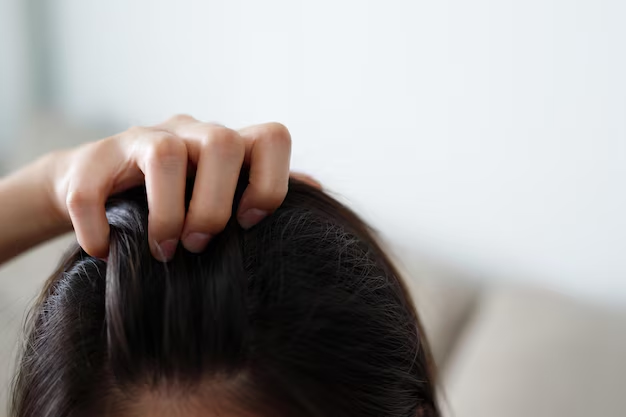Unveiling Scalp Psoriasis: What Triggers This Skin Condition?
Imagine the frustration of dealing with persistent itching, flaking, and discomfort on your scalp. For millions of people worldwide, this is a daily reality, thanks to a condition called scalp psoriasis. This common skin disorder can be both physically and emotionally taxing, but understanding what triggers it is the first step in managing it effectively. In this article, we'll delve into the underlying causes of scalp psoriasis, explore its symptoms, and consider various lifestyle and environmental factors that may exacerbate the condition.
What is Scalp Psoriasis?
To start, let's break down what we're dealing with. Psoriasis is an autoimmune condition that speeds up the life cycle of skin cells, causing them to build up rapidly on the skin's surface. This results in the characteristic silver-white scales and patches of red, inflamed skin. When this process occurs on the scalp, it's termed scalp psoriasis.
Typical Symptoms
- Red patches: Often covered with a silvery scale.
- Itchiness: Ranging from mild to severe.
- Dry scalp: Leading to cracking and bleeding.
- Temporary hair loss: Resulting from excessive skin shedding and scratching.
Unraveling the Causes
While the exact cause of psoriasis, including scalp psoriasis, remains somewhat elusive, researchers believe it's a combination of genetics, immune system malfunctions, and environmental factors.
Genetic Predisposition
A significant factor in the development of psoriasis is genetics. If one or more of your family members have had psoriasis, there's a greater likelihood that you could develop it too. Certain genes have been identified that appear to increase the risk, suggesting a hereditary component.
Immune System Dysfunction
At the heart of psoriasis is a malfunctioning immune system. In healthy individuals, the immune system protects against infections and diseases. However, in those with psoriasis, the immune system mistakenly targets healthy skin cells, accelerating their production. This rapid build-up of cells forms the scales and red patches characteristic of psoriasis.
Environmental and Lifestyle Triggers
While genetic and immune factors lay the groundwork for psoriasis, various lifestyle and environmental factors can trigger or aggravate the condition.
Stress
Stress is a significant trigger for psoriasis flare-ups. The body's response to stress can influence the immune system, potentially exacerbating the condition. Learning how to manage stress through techniques like meditation and yoga may help in reducing the frequency and severity of flare-ups.
Weather Conditions
Changes in weather, including dry air and cooler temperatures, can worsen psoriasis symptoms. This is because cold weather and indoor heating can dry out the skin, triggering flare-ups. Conversely, sunlight may improve symptoms due to the skin-healing properties of ultraviolet light.
Skin Injuries
The Koebner phenomenon is a known response in psoriasis where new lesions appear at sites of skin trauma, such as cuts, scrapes, or sunburn. Protecting your skin from injuries can help minimize outbreaks.
Infections
Certain infections, particularly strep throat, can trigger or worsen psoriasis symptoms. This likely links back to immune responses that trigger or exacerbate the condition.
Medications
Some medications can trigger psoriasis or worsen existing symptoms. This includes drugs like lithium, beta-blockers, and certain anti-malarials. Always discuss any medication concerns with your healthcare provider.
Managing Scalp Psoriasis
Understanding the causes and triggers of scalp psoriasis is essential in managing the condition effectively. While there's no cure yet, several strategies can help alleviate symptoms and prevent flare-ups.
Keep the Scalp Hydrated
Moisturizing your scalp regularly can help reduce dryness and flakiness. Look for products designed for psoriasis or sensitive skin.
Avoid Triggers
Identifying and avoiding personal triggers is crucial. Maintaining a stress diary or a log of flare-ups can help pinpoint what worsens your symptoms, allowing you to make lifestyle adjustments.
Diet and Nutrition
Nutrition plays an important role in psoriasis management. Eating a balanced diet rich in omega-3 fatty acids, fruits, and vegetables while minimizing alcohol and unhealthy fats may benefit your overall condition.
Regular Check-Ups
Frequent consultations with a dermatologist can help track the progress of treatment and make necessary adjustments. Dermatologists can also recommend topical treatments or systemic interventions based on severity.
Differentiating Psoriasis from Other Scalp Conditions
While scalp psoriasis is common, it can easily be confused with other conditions like seborrheic dermatitis or dandruff. Understanding the differences is key to appropriate management.
Seborrheic Dermatitis vs. Scalp Psoriasis
While both result in scaly skin, seborrheic dermatitis often appears as greasy yellow scales and is usually less inflamed. In contrast, scalp psoriasis presents as dry, thicker scales and may extend beyond the hairline.
Dandruff vs. Scalp Psoriasis
Dandruff typically manifests as smaller, white flakes and is usually less persistent. It doesn't tend to cause long-lasting inflammation as psoriasis does.
Seeking Support and Building Awareness
Living with scalp psoriasis can be challenging, but remember, you're not alone. Seeking out support groups or forums, whether in-person or online, can provide comfort and foster knowledge sharing. Additionally, raising awareness and advocating for understanding can help dismantle the social stigma often associated with psoriasis.
Final Reflection
Scalp psoriasis, while inconvenient, is not insurmountable. Understanding its causes, recognizing triggers, and implementing practical management techniques can significantly enhance your quality of life. By staying informed and proactive, individuals with scalp psoriasis can take control of their condition and lead a fulfilling life.
Summary of Key Takeaways 📝
- Scalp psoriasis is an autoimmune condition, resulting largely from genetic predisposition and immune system dysfunction.
- Common symptoms include red patches, itchiness, and dry scalp.
- Triggers such as stress, weather changes, infections, and medications can exacerbate symptoms.
- Management involves keeping the scalp hydrated, avoiding known triggers, and seeking regular dermatological check-ups.
- Differentiating from other scalp conditions like seborrheic dermatitis can aid proper treatment.
- Support networks offer valuable resources and community support.
- Awareness and proactive management are crucial for maintaining quality of life. 🌿
By embracing these insights and adjusting lifestyle choices, individuals can navigate the complexities of scalp psoriasis more effectively, paving the way for healthier living.

